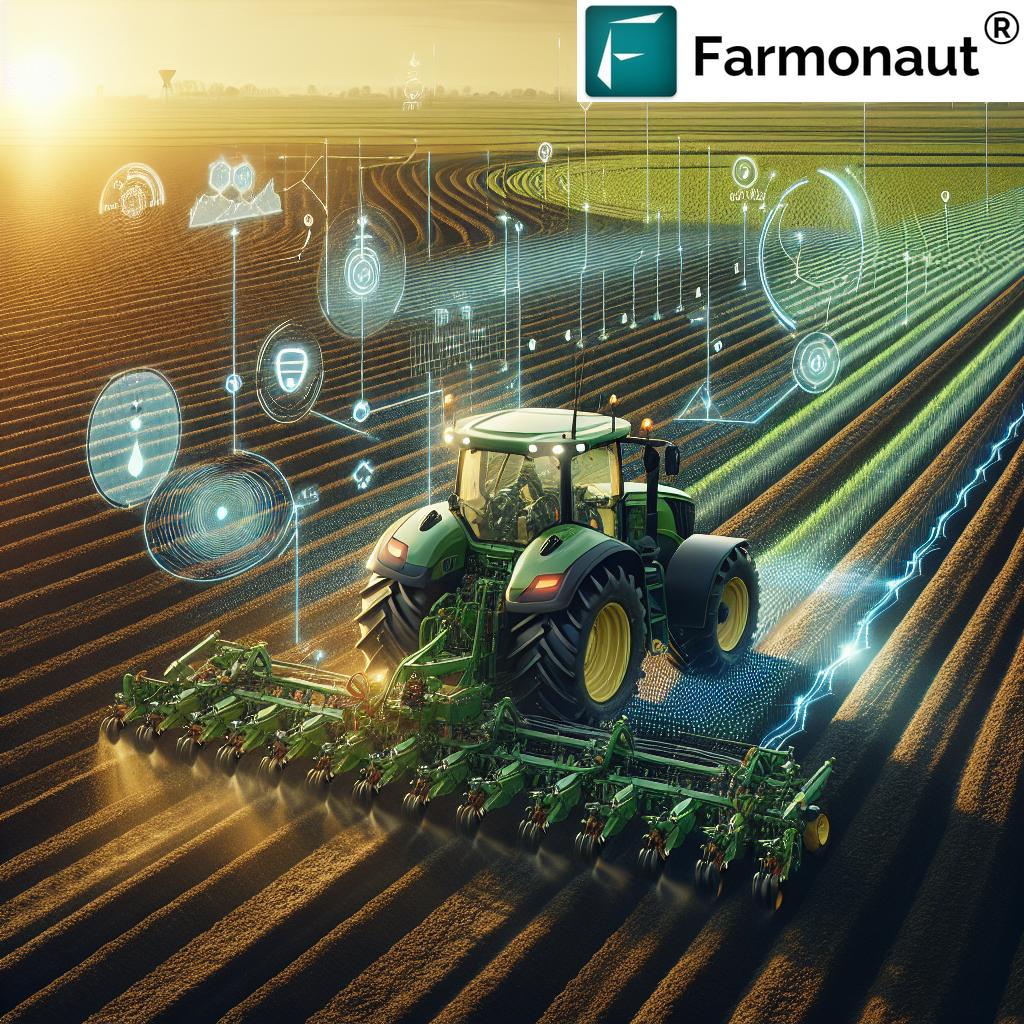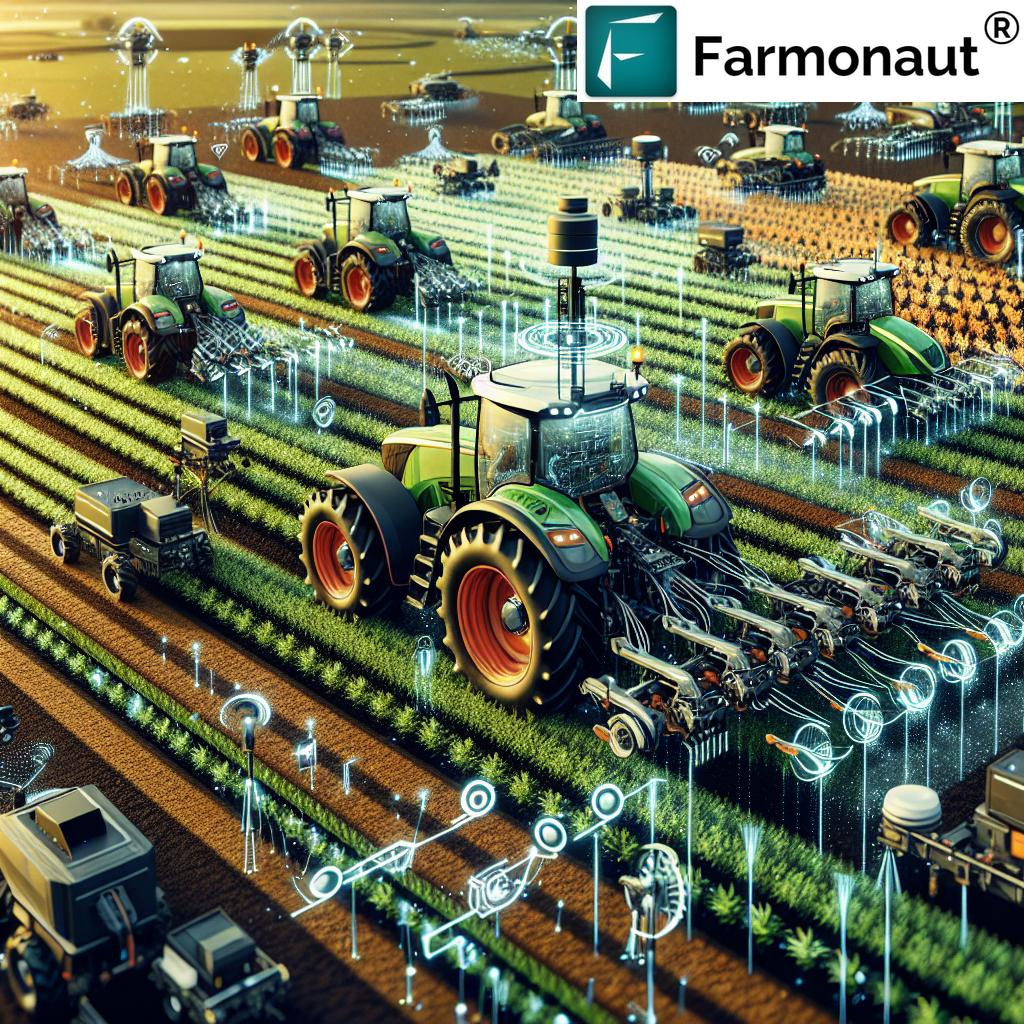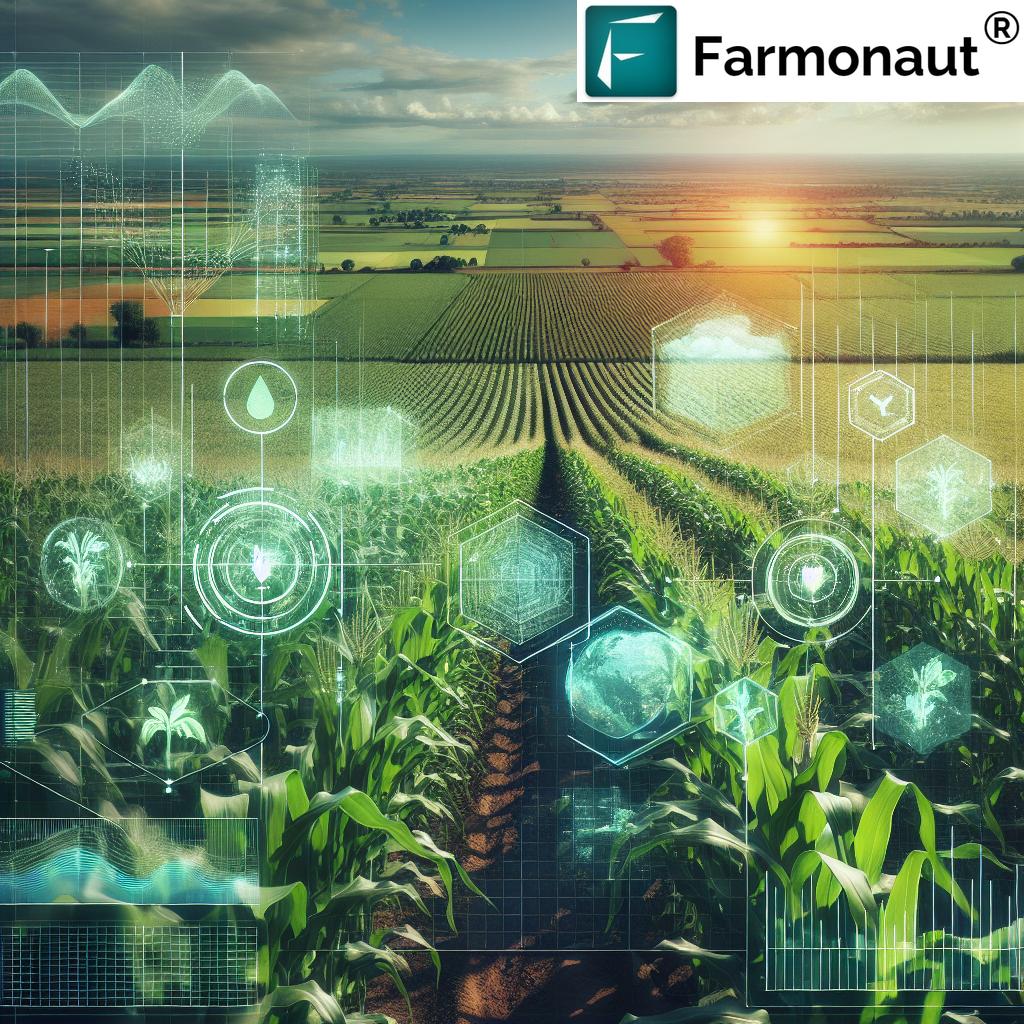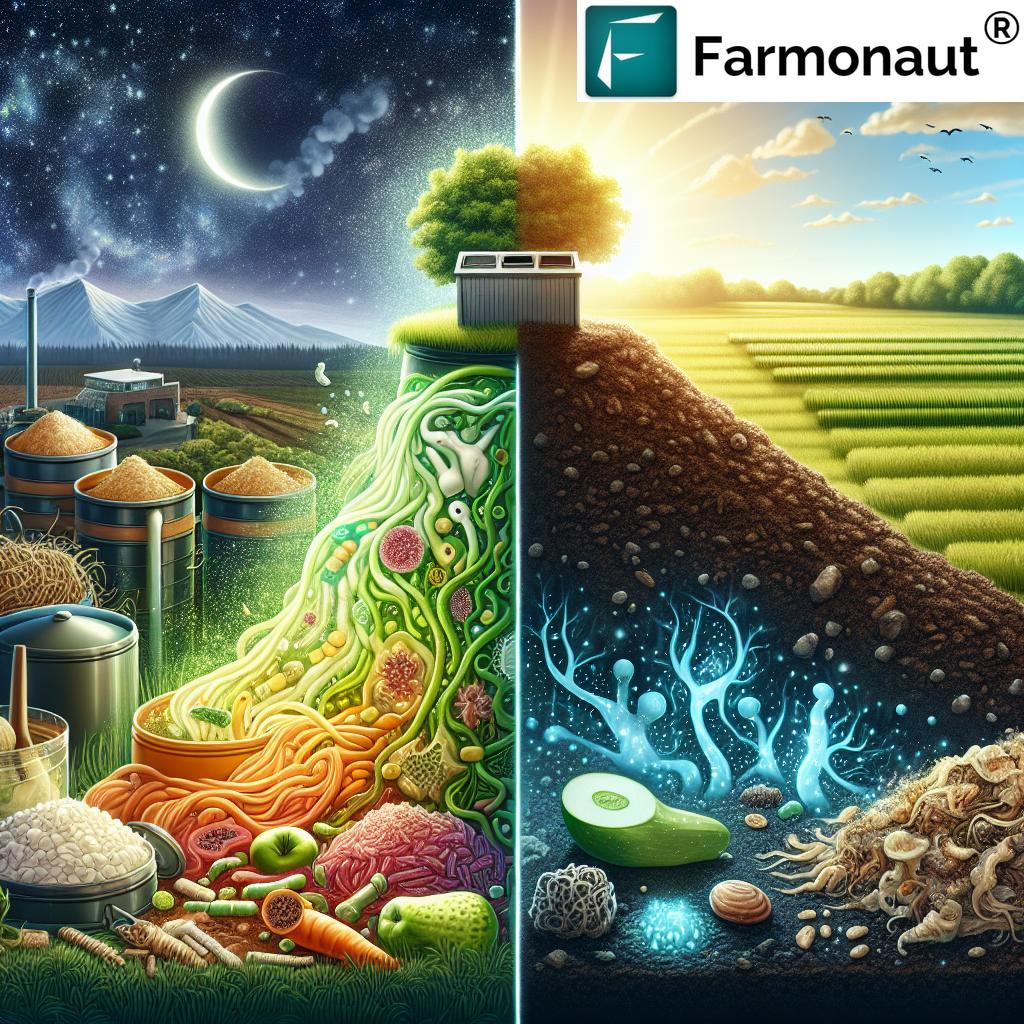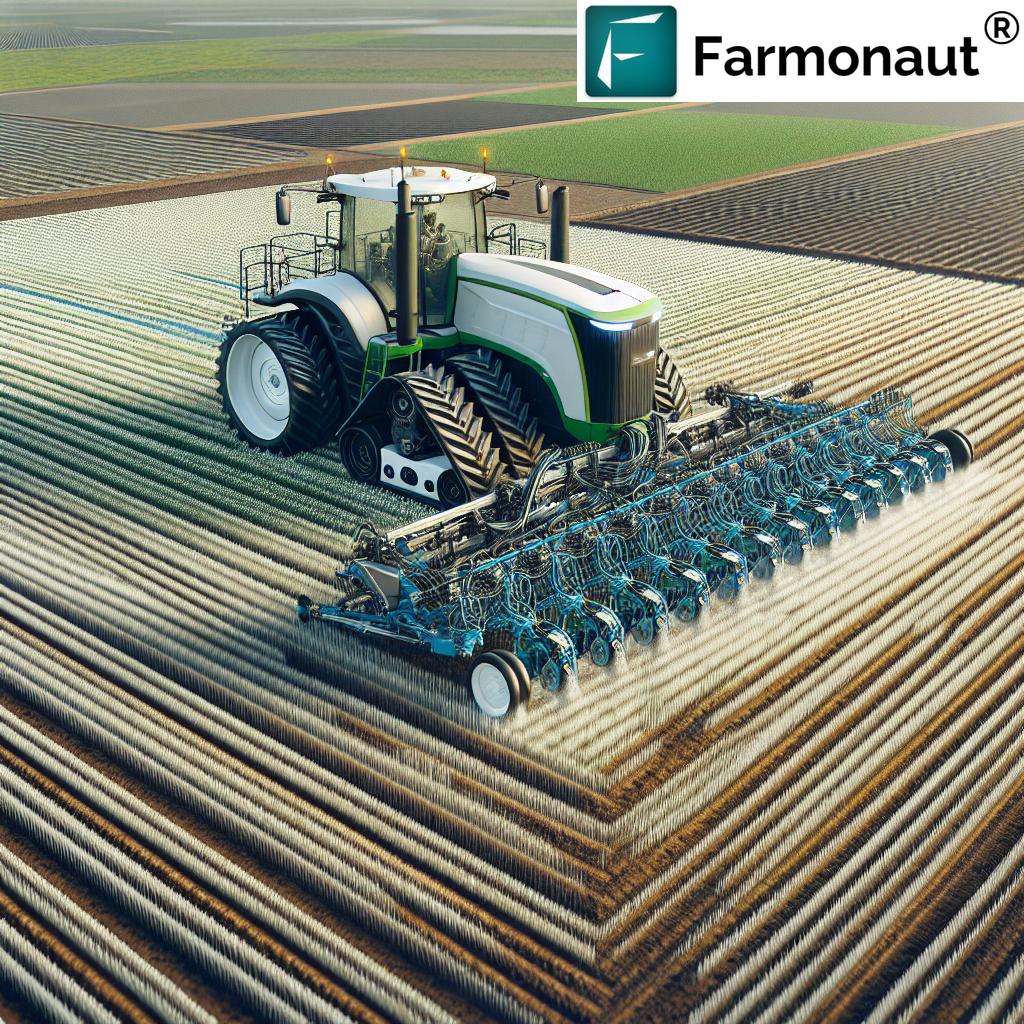Precision Grow Autonomous Tractors: 7 Shocking Upgrades
“Autonomous tractors can reduce fuel consumption by up to 20% with AI-driven route optimization.”
Table of Contents
- Summary: The Significance of Precision Grow Autonomous Tractors
- Technological Foundations of Autonomous Tractors
- 7 Shocking Upgrades in Autonomous Tractors
- 1. Precision Mapping and Advanced Field Analysis
- 2. AI-Powered Resource Optimization
- 3. Continuous 24/7 Autonomous Operations
- 4. Data-Driven Farm Management and Real-Time Decision Making
- 5. Next-Generation Crop Health Monitoring Systems
- 6. Seamless Integration with Farm Management Platforms
- 7. Sustainability and Environmental Impact Reduction
- Comparison Table: Autonomous Tractor Upgrades
- Market Growth and Adoption Trends
- Major Challenges in Autonomous Tractor Adoption
- How Farmonaut Supports Precision & Autonomous Farming
- Recent Global Developments in Autonomous Tractors
- What Does the Future Hold?
- Frequently Asked Questions
- Get Started: Precision Farming with Farmonaut
Summary: The Significance of Precision Grow Autonomous Tractors
The advent of autonomous tractors marks a transformative turning point in worldwide agriculture. By integrating the powers of AI in farming, advanced sensor technology, and precision agriculture technologies, these revolutionary machines achieve what was once unimaginable: real-time crop health monitoring, exact resource application, and continuous unmanned operation—dramatically improving agricultural efficiency, sustainability, and productivity.
Unlike traditional tractors, autonomous farming machines are designed to perform a comprehensive variety of complex tasks with minimal human intervention. This directly addresses contemporary agricultural challenges such as labor shortages, rising input costs, pressure to conserve natural resources, and increasing environmental concerns.
At their core, autonomous tractors represent a synergy of advanced technologies: AI-powered algorithms for analysis and decision-making, multi-spectrum sensors for field data collection, and GNSS systems for sub-inch accurate positioning. As leaders like Farmonaut make these tools accessible globally, the promise of data-driven, sustainable agriculture is now within reach for farmers everywhere.
How Farmonaut’s Satellite Technology is Revolutionizing Land Use in Agriculture
Technological Foundations of Autonomous Tractors
The remarkable capabilities of autonomous tractors stem from their multi-layered technological foundations. These machines are engineered to sense, analyze, and act with a high level of precision. Let’s break down the core technologies that have made this advancement possible:
- Advanced Sensor Technology in Agriculture: Utilizing an array of multispectral cameras, LiDAR (Light Detection and Ranging), ultrasonic, and infrared sensors, autonomous tractors can create detailed 3D field models, enabling precise mapping and real-time obstacle detection, even under diverse weather conditions.
- Artificial Intelligence and Machine Learning: AI algorithms process sensor data—enabling tractors to navigate complex terrains, optimize resource usage, and identify crop health issues instantly. As a result, AI in farming is rapidly re-defining operational efficiency on the field.
- GNSS for Farm Equipment: Using Global Navigation Satellite Systems such as GPS, GLONASS, and Galileo, tractors can follow predetermined paths with centimeter-level accuracy, minimizing overlaps and misses during planting, fertilizing, and irrigation operations.
Together, this combination of technologies empowers precision agriculture—unlocking unprecedented resource optimization and enabling fully autonomous field operations.
Discover Farmonaut’s Advanced Agri Solutions: Precision Crop Area Estimation – Egypt Case Study
Precision Grow Autonomous Tractors: 7 Shocking Upgrades
Let’s explore the seven most impactful upgrades driving the evolution of autonomous tractors and precision agriculture technologies—unveiling how these changes solve real-world farming challenges, deliver productivity boosts, and promote measurable sustainability gains.
“Advanced sensors in precision tractors enable real-time monitoring of over 15 crop health parameters simultaneously.”
1. Precision Mapping and Advanced Field Analysis
Autonomous tractors harness powerful mapping systems—using high-resolution cameras, LiDAR, and multispectral sensors—to create detailed 3D models of farm terrains. These models facilitate:
- Field boundary identification and land use planning
- Efficient irrigation system design and drainage layout
- Optimal planting patterns for maximum yield and resource utilization
Precise field analysis enables us to tailor farming strategies to every micro-zone of the field, slashing both input waste and inefficiency.
2. AI-Powered Resource Optimization in Agriculture
Leveraging AI in farming and advanced sensor technology, these tractors don’t just apply water, fertilizers, or pesticides—they analyze exactly where and how much is needed. This resource optimization in agriculture means:
- Applying inputs only where required, minimizing waste
- Reducing the environmental impact and input costs
- Promoting sustainable farming solutions and improved soil health
Farmonaut’s Carbon Footprinting tools support such strategies, providing precise metrics on emissions and environmental impact for farms of all scales.
Farmonaut | How to Generate Time Lapse
3. Continuous 24/7 Autonomous Operations
One of the most transformative capabilities: these autonomous farming machines can work continuously, day or night, rain or shine. Thanks to AI-powered navigation and robust sensor arrays, tractors perform field operations with little interruption, including:
- Timely planting during optimal windows
- Rapid harvesting to maximize yield and decrease crop losses
- Uninterrupted irrigation, fertilization, and pest management
This 24/7 operational capability is especially valuable in regions prone to labor shortages or with narrow climatic timeframes for key farming activities.
4. Data-Driven Farm Management and Real-Time Decision Making
By integrating crop health monitoring systems and environmental sensors (measuring soil moisture, ambient weather, nutrient levels, etc.), autonomous tractors become vital contributors to a data-driven farm management strategy:
- Continuous real-time data collection from every field operation
- Instant analysis via AI algorithms and actionable alerts for emerging issues
- Resource allocation decisions based on live field conditions, not estimates
When integrated with advanced platforms like Farmonaut, these tractors feed critical data into a central dashboard, enhancing both operational efficiency and long-term planning.
Satellite & AI Based Automated Tree Detection For Precise Counting and Location Mapping
Farmonaut’s Large-Scale Farm Management System facilitates the seamless aggregation, visualization, and analysis of in-field data gathered by autonomous tractors. This empowers large agricultural enterprises to manage hundreds (or even thousands) of hectares efficiently.
5. Next-Generation Crop Health Monitoring Systems
Modern autonomous tractors are equipped with multi-spectral sensors and advanced imaging capabilities, enabling:
- Detection of over 15 distinct crop health parameters in real time (leaf color, moisture, disease symptoms, nutrient deficiencies, etc.)
- Early identification of pests, diseases, and weed outbreaks
- Instantaneous generation of variable rate task maps for treatment
Platforms like Farmonaut’s Crop Plantation & Forest Advisory Tools complement field sensors by providing satellite-based crop health insights directly to farmers’ smartphones, empowering quick, evidence-based interventions.
6. Seamless Integration with Farm Management Platforms
The latest autonomous tractors are designed for easy integration with digital farm management systems. For example:
- Farmonaut Fleet Management Solutions let you track tractor locations, monitor fuel use, and optimize task scheduling in real-time, all from one dashboard.
- Compatibility with satellite weather forecasts, advisory alerts, and even blockchain traceability features (like Farmonaut Product Traceability) ensures every pass across the field builds a verifiable, auditable record.
Such seamless integration helps automate documentation, improve compliance, and drive smarter, data-driven farm operations.
7. Sustainability and Environmental Impact Reduction
Every technology upgrade in autonomous tractors focuses on minimizing the environmental footprint of agriculture, such as:
- Reduced chemical usage via precise and targeted application (saving water, fuel, and nutrients)
- Lower greenhouse gas emissions thanks to fewer, more efficient field passes
- Improved soil structure and health by minimizing compaction
- Water savings through smart irrigation scheduling
In tandem, Farmonaut Carbon Footprinting tools deliver quantifiable emission data to track and achieve sustainability goals.
Comparison Table of Autonomous Tractor Upgrades: Features, Benefits, and Impact
| Upgrade Name | Description | Estimated Productivity Boost (%) | Estimated Sustainability Benefit | Technology Used |
|---|---|---|---|---|
| Precision Mapping & Field Analysis | 3D field models optimize boundary planning, irrigation, and planting schemes | +12% | 20% water saved annually | LiDAR, Multispectral Cameras, AI, GNSS |
| AI-Powered Resource Optimization | AI analyzes and applies resources only where required, minimizing waste | +15% | 25% reduction in fertilizer and pesticide use | AI Algorithms, Soil & Nutrient Sensors |
| 24/7 Operational Capability | Round-the-clock operation enables timely task completion in any weather | +20% | 30% reduction in labor hours & fuel | Robust AI Navigation, GNSS |
| Data-Driven Farm Management | Continuous data collection drives precision decisions and faster response | +14% | Reduces unnecessary field passes (15% fuel savings) | Advanced Sensors, Farm Management Software, AI |
| Next-Gen Crop Health Monitoring | Multispectral sensing for disease/pest/deficiency detection in real time | +11% | Early intervention reduces loss by 10% | NDVI/Satellite Imaging, AI, Multispectral Sensors |
| Seamless Integration with Management Platforms | Syncs tractor data with apps for centralized control & analysis | +8% | 10% improved compliance and traceability | API Connectivity, Blockchain, Web/Mobile Integration |
| Sustainability & Environmental Impact | Carbon tracking, reduced emissions, and healthier soil | +10% | 30-40% lower GHG emissions | Emissions Sensors, Analytics, Satellite Monitoring |
Market Growth and Adoption Trends
The global market for autonomous tractors continues its explosive growth: Valued at $2.4 billion in 2023, projections estimate a leap to $7.1 billion by 2028 (24% CAGR). This expansion is fueled by:
- Labor shortages across major agricultural regions, prompting demand for autonomous solutions
- Growing adoption of smart precision agriculture technologies
- Accelerating advancements in AI, sensors, and GNSS navigation systems
- Pressure for environmental stewardship and resource-efficient farming
As autonomous tractors become mainstream, forward-thinking farmers and agribusinesses are achieving substantial productivity and sustainability benefits. Paired with solutions such as Farmonaut’s scalable monitoring, management, and traceability tools, the road to effortless high-tech farming is becoming a reality for every scale of operation.
Major Challenges in Autonomous Tractor Adoption
While the benefits are compelling, several challenges must be navigated for widespread adoption:
- High Initial Cost: The upfront cost for autonomous machines is currently higher than conventional tractors—posing a barrier for small and medium farms.
- Technical Expertise: Operating and maintaining these advanced systems requires upskilling, proper training, and robust support frameworks for farmers.
- Harsh Field Conditions: Autonomous tractors must be highly reliable against dust, mud, extreme heat/cold, and unpredictable weather.
- System Integration: Achieving seamless compatibility with existing farm equipment, workflows, and management software can be complex.
Addressing these obstacles will require a blend of ongoing technological innovation, expanded training support, finance solutions, and practical, flexible platforms (like Farmonaut) that work across devices and farm sizes.
How Farmonaut Empowers Precision and Autonomous Farming
Farmonaut accelerates the adoption of precision agriculture technologies with a powerful, scalable digital ecosystem accessible via Android, iOS, Web apps, and API integration. Here’s how our suite complements autonomous tractors:
- Satellite-Based Crop Health Monitoring: Provides real-time NDVI/vegetation indices, soil moisture, and field health via Farmonaut’s App—delivering actionable insights to enhance resource optimization and support timely interventions.
- Jeevn AI Advisory System: Analyzes satellite data and real-time field inputs to provide personalized farm management advice, ensuring efficient decisions and supporting autonomous tractor operations.
- Blockchain-Based Traceability: Our traceability platform delivers transparency from farm to shelf, integrating equipment operation data for tighter compliance and better supply chain reputation.
- Fleet and Resource Management: Track fleets, schedule autonomous tasks, monitor fuel and resource usage, and minimize operational costs—all within a simple dashboard.
- Carbon Footprinting and Emissions Monitoring: Our carbon calculator provides quantifiable data to help farms achieve emission reduction goals and document their sustainability journey.
- APIs for Developers: Integrate satellite data, weather forecasts, and more directly into autonomous tractor systems or custom farm analytics solutions (Developer Docs).
- Crop Loan and Insurance Verification: Use satellite-based reporting for faster loan approvals and risk management—matching autonomous machinery investments to field performance verification.
- Flexible Subscription Model: Scale solutions to match any farm size—from smallholders to governments or enterprises—at a fraction of typical hardware-based systems.
Learn more or experience precision autonomy by downloading the Farmonaut app today.
Recent Global Developments in Autonomous Tractors
-
Deere boosts bet on autonomous tractors with new machines – Showcasing mainstream industry confidence. -
Autonomous tech is coming to farming. What will it mean for crops and workers who harvest them? -
AI made its way to vineyards. Here’s how the technology is helping make your wine
– Illustrates cross-crop application from row crops to specialty agriculture.
What Does the Future Hold?
The pace of developments in AI, autonomous control, and advanced sensor technology continues to accelerate. As platforms like Farmonaut make precision ag tools more affordable and accessible, we expect:
- Wider adoption of autonomous tractors among small and medium farmers worldwide
- Enhanced AI algorithms for diagnostics, predicting crop health issues before symptoms are visible
- Even richer integration with satellite-based monitoring and advisory systems
- Growing emphasis on sustainability metrics and climate-smart farming
The autonomous tractor is set to be the central node in the digital farm—bridging real-time in-field actions with cloud analytics and global supply chains. With the right technologies, we can unlock more resilient, productive, and climate-friendly agriculture for our planet’s future.
Frequently Asked Questions
What is an autonomous tractor, and how does it work?
An autonomous tractor is a self-driving agricultural machine that uses a combination of sensors, AI algorithms, and GNSS positioning to operate with minimal human intervention. Its onboard technology can map fields, detect obstacles, analyze soil and crop conditions, and accurately carry out tasks like planting, tilling, fertilizing, and harvesting.
How do advanced sensor technologies benefit precision agriculture?
Advanced sensors—including multispectral, LiDAR, ultrasonic, and environmental sensors—continuously collect real-time data on field and crop conditions. This enables targeted input application, rapid problem detection, and better management decisions—improving yields and reducing input waste.
Is Farmonaut an equipment manufacturer or provider of autonomous tractors?
No. Farmonaut is an agricultural technology company focused on satellite-based farm management, crop health monitoring, AI advisory, resource management, and traceability tools for farmers and agribusinesses. Farmonaut does not manufacture or sell tractors or farm inputs.
How do I integrate Farmonaut’s digital tools with my autonomous tractors?
Farmonaut provides APIs and app-based interfaces (view API details) that can be connected to compatible tractor systems, enabling automatic logging, data synchronization, and visualization of field data for powerful, data-driven farming.
How can I try Farmonaut’s monitoring and management solutions?
Simply download our mobile or web app to get started. Our subscription plans are tailored for individual farmers, agribusinesses, and large institutions.
Get Started: Embrace The Next Era of Precision Agriculture
The age of Precision Grow Autonomous Tractors and AI-driven farm management has arrived—delivering transformative upgrades that empower farmers, conserve resources, and revolutionize agriculture.
- Maximize your yield, efficiency, and sustainability using Farmonaut’s digital agri-solutions
- Leverage field-specific crop health monitoring from anywhere, anytime
- Connect your machinery and management workflows with API integration for seamless automation
- Move toward climate-smart farming with built-in carbon and sustainability reporting
The future of farming is autonomous, connected, and sustainable. Join us at Farmonaut, bring your farm into the digital era, and unlock the true value of precision agriculture today!

